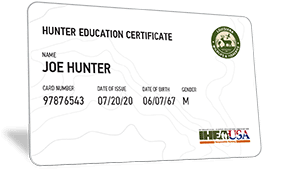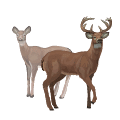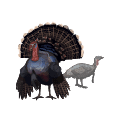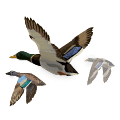
AGE REQUIREMENTS FOR LOUISIANA HUNTERS
Every hunter in Louisiana who was born on or after September 1st, 19689 is required to obtain Hunter Education Certification. Hunters must be at least 10 years of age in order to get certified.

LOUISIANA HUNTING EDUCATION REQUIREMENTS
WHAT IS A LOUISIANA HUNTER EDUCATION CERTIFICATE
A Louisiana Hunter Education Certificate proves that you’ve obtained the knowledge needed to hunt safely, responsibly, and ethically, within the state of Louisiana. All hunters in Louisiana who were born on or after September 1st, 1969 are required to get certified.
WHERE CAN I GET MY LOUISIANA HUNTER EDUCATION CERTIFICATE?
You can obtain your Louisiana Hunter Education Card by completing a Louisiana Department of Fisheries and Wildlife-approved course. Courses can be taken either in-person or by completing an online course in addition to an in-person field day.
Classroom Course Option
Hunter Education classroom courses take a minimum of 10 hours of study and are typically held over a 2-3 day period. These courses are free and ideal for students of all ages.
Online Course + Field Day Course:
The online + field day combination course provides learners with the option of completing a portion of the hunter education course online and at home. Upon completing the online portion of the course, students will be issued a field-day voucher, which will grant them admission to the field day portion. Within the 5-hour field-day portion of the course, students must demonstrate their learned skills, and complete a final test. Upon successful completion of the online and field-day courses, students will be issued their permanent Hunter Education Certificate.
Online + Field day combinations courses are recommended for students who are 14 years of age or older.
HOW OLD DO I HAVE TO BE TO GET A HUNTER EDUCATION CERTIFICATE IN LOUISIANA?
You must be 10 years of age or older to complete a hunter education course in Louisiana, and obtain a Hunter Education Certificate.
Is my Louisiana Hunter Education Certificate valid in other states?
The Louisiana Hunter Education Certificate will be accepted in any US state, province, or country which also requires mandatory hunter education, meaning hunters who have obtained their Louisiana Hunter Education Certificate may use it to hunt in other states. This is known as “reciprocity”.
What's the difference between a Hunter Education Certificate and a Hunting License?
A Hunter Education Card proves that you’ve obtained the knowledge you need to hunt safely and ethically in Louisiana, and is different from a Hunting License. The Hunting Licence is similar to a permit and is required to hunt any game animal within the state. Different licenses and permits may be required depending on which game animal is being hunted.

HUNTING LICENSES, STAMPS AND PERMITS
HUNTING LICENSES
A Hunting License is required in the state of Louisiana to hunt any game animal. There are a variety of license types available depending on your age, residency status, and what type of game you plan to hunt. Some of the hunting license types in Louisiana include:
Basic Hunting License
All residents and nonresidents 16 years of age or older, who hunt within the state of Louisiana, are required to obtain the Basic Hunting License. The license is required to hunt, take, possess, or transport any wild bird or quadruped that may be legally hunted. Hunters must then obtain additional licenses to hunt, take, transport, or possess specific species including deer, turkey, migratory game birds, etc.
Big Game License
This license type is required in addition to the Basic Hunting License and is required to hunt, take, possess, or transport deer, turkey, or bobcat. The Big Game License is available to both residents and non-residents, however fees may vary depending on residency status.
Louisiana Wild Turkey
This license type is required to hunt turkey within the state of Louisiana, and is required in addition to both the Basic Hunting License and Big Game License. This license type is available to both residents and nonresidents, however fees may vary depending on residency status.
WMA Permit
The WMA Permit is required to hunt on any land that is managed by the Louisiana Department of Wildlife and Fisheries. Including Wildlife Management Areas (WMAs), and habitat and conservation areas. The license is required for hunters who are ages 18-59, and is available to both residents and non-residents.
LOUISIANA HUNTER CERTIFICATION AGE REQUIREMENTS

10 & 11 YEARS OF AGE
Certified hunters who are 10 & 11 years of age must be supervised by a qualified adult while hunting. A ‘qualified adult’ means a person who is 18 years of age or older who has either obtained hunter education certification, holds a valid unrestricted hunting license within the state of Louisiana, or who was born before September 1st, 1969. The supervising person must be within normal voice control and have a direct line of sight to the person being supervised.

Non-Certified Hunters
Hunters who were born on or after September 1st, 1969, who have not obtained hunter education certification, who wish to hunt within the state of Louisiana must also be directly supervised by a qualified person to legally hunt within the state. A qualified person means a person who is 18 years of age or older who has either obtained hunter education certification, holds a valid unrestricted hunting license within the state of Louisiana, or who was born before September 1st, 1969. The supervising person must be within normal voice control and have a direct line of site to the person being supervised.

Born on or after Sept. 1st, 1969
Hunters who were born on or after September 1st, 1969, who have not obtained hunter education certification, who wish to hunt within the state of Louisiana must also be directly supervised by a qualified person to legally hunt within the state. A qualified person means a person who is 18 years of age or older who has either obtained hunter education certification, holds a valid unrestricted hunting license within the state of Louisiana, or who was born before September 1st, 1969. The supervising person must be within normal voice control and have a direct line of site to the person being supervised.

Louisiana's Hunting Fines

Hunter Education Violation (first violation)
Up to $50 + court fees

Hunting without a valid License or Permit (first violation)
Up to $500

Deer or bear take method violations (first violation)
Up to $350

Game animal possession violations (first violation)
Up to $950

Taking deer or bear during the closed season
Up to $200
LOUISIANA HUNTING FAQS
DO I NEED A HUNTING LICENSE TO HUNT WITHIN THE STATE OF LOUISIANA?
Yes. A Hunting License is different from a Hunter Education Certificate and is required for any person who hunts any game animal within the state. This includes both residents and non-residents. Varying licenses must be purchased and carried depending on the hunter’s age, residency, and the type of game being hunted. Certain exceptions may apply depending on the game animal being hunted. For more information on Louisiana, hunting licenses visit the Louisiana Wildlife and Fisheries website.
WHAT ARE THE LOUISIANA TAGGING REQUIREMENTS?
Certain game animals must be tagged after they’re taken, including big game animals such as deer and turkey. It’s important for hunters to understand the tagging and/or harvest reporting requirements for the game animal they’re hunting, and to ensure that the animal is tagged and reported properly.
Tagging Requirements
Hunters must obtain a turkey or deer tag, and have the tag in their possession prior to legally hunting turkey or deer within the state.
The tag must be properly attached to the carcass of the animal immediately after it’s been harvested, prior to being permitted to transport the animal. The hunter must properly mark the tag with the date and parish of the take, in addition to recording the date and parish on the harvest report card portion of the deer or turkey tag license.
Once the animal has been tagged, the tag must remain attached to the carcass while being kept at a hunt camp, or while the carcass is being transported home or to a cold storage facility.
Game Check and Tag Validation Requirements
Deer and turkey tags must be validated within 72 hours of the harvest, using the Game Check system. Tags can be validated either by phone by calling 844-522-4325 or online by using the Louisiana Department of Wildlife and Fisheries Game Check system.
Deer hunters who have harvested a deer within the WMA may also choose to validate their deer tag in-person at an operational deer-check station within the area. If you plan to hunt deer within a WMA be sure that you’re aware of deer-check stations in the area and check before-hand to ensure they are open.
WHAT ARE THE HUNTER ORANGE REQUIREMENTS IN LOUISIANA?
Hunter orange or pink are mandatory within the state of Louisiana for all hunters hunting white-tailed deer, regardless of the firearm type being used. However, the minimum amount of hunter orange pr ink required may vary depending on the type of hunting and whether the hunter is on public or private land.
The following hunter orange regulations apply within the state of Louisiana:
- Hunters who are taking game on privately owned land may choose to wear 400 square inches of hunter orange or pink on their head, chest and/or back OR a hunter orange or pink cap or hat in lieu of the 400 square inch minimum.
- Hunters who are taking deer during the open firearms deer season are required to wear a minimum of 400 square inches of hunter orange or pink on their head, chest and/or back.
- Hunters who are taking game from an elevated stand on private land are not required to wear hunter orange or pink. However, if firearms are permitted on the property the hunter must wear a minimum of 400 square inches of hunter orange or pink on their head, chest, and/or back, OR a hunter orange or pink hat or cap, when walking to or from the stand location.
- Archery hunters who are taking deer on lands where firearms are not permitted are not required to wear hunter orange or pink.
WHAT ARE THE BAG LIMITS IN LOUISIANA?
Bag limits are imposed on hunters to restrict the number of a particular game animal that can be taken. Bag limits may be daily or seasonal depending on the type of animal. For example, daily bag limits may be imposed which restrict the number of a particular game species which may be taken per hunting day, while seasonal bag limits restrict the number of a particular game animal that may be taken by a hunter within the hunting season.
Bag limits may vary annually depending on game species populations. Hunters must understand and follow bag limit restrictions. Violations may result in fines. For more information on bag limits visit the Louisiana Department of Wildlife and Fisheries website.

GAME AND NON-GAME SPECIES
GAME SPECIES
Louisiana offers a wide variety of game species for all types of hunters. The states varied geography, expansive swamps, and marshes, and coastal areas result in a number of game opportunities for hunters. Some of the states game animals include:
- Big game including white-tailed deer and turkey.
- Small game including rabbit, squirrel, crow, and grackles.
- Waterfowl and other migratory game birds including ducks, geese, and dove.
- Furbearers including raccoon, bobcat, and opossums.
NON-GAME SPECIES
Nongame species within Louisiana make up a majority of the state’s wildlife and include mammals, birds, fish, reptiles, amphibians, and invertebrates which typically may not be hunted, are considered a nuisance, or are protected, endangered, or at risk. There is, unfortunately, a lengthy list of endangered, protected, and threatened species within the state. For more information on nongame, and endangered species within the state visit the Louisiana Wildlife and Fisheries website.
INVASIVE SPECIES
Invasive animals and other pests have been introduced to the United States, including the State or Louisiana, and have become a threat to native wildlife. These animals, plants, fish, and invertebrates typically have no natural predators which can result in rapid spread and population growth. This in turn can seriously harm the state’s lands and waters, and can be detrimental to the health and population numbers of a variety of the state’s native plants and animals. Some common Invasive species in Louisiana include Asian Tiger Mosquito, Zebra Mussel, Water Hyacinth, Red Imported Fire Ant, as well as the Feral Hogs – one of the most destructive and notable of the state’s pests.
In order to protect Louisiana’s native plants and animals, invasive species must be controlled and eradicated. Anyone who encounters or suspects that they have encountered an invasive species within the state is encouraged to report the sighting so that it can be monitored and controlled. For information on how to report various types of invasive species in Louisiana visit the US Department of Agriculture, National Invasive Species Information Center.

LOUISIANA HUNTING SEASONS
Hunting seasons and dates may change annually per game animal, depending on a variety of factors. Season dates are further broken out, region or Wildlife Management Units (WMUs). Additionally, seasons are often categorized by firearm time, including archery, firearms, and muzzleloader or “primitive” firearms seasons.

Deer
Deer seasons in Louisiana are organized by firearm type including guns, archery, and muzzleloader seasons, in addition to the type of deer (ex buck seasons, doe seasons, or either sex). Louisiana also holds a youth-only and honorably discharged veterans season. Deer season within the state typically opens in mid-September with later seasons closing towards the end of January of the following calendar year.

Turkey
Turkey seasons within Louisiana are held within select regions of the state, which are organized into three areas (A, B, & C). The regular season is held in April, and typically closes in May, with an earlier season being held in March for youth and wheel-chair confined hunters.

Dove
Dove seasons in Louisiana are organized by “zone”, and include a north-zone and south-zone. The season typically opens early-mid September and closes as late as January of the following calendar year. Hunters should note the regulations may differ depending on the species of dove being hunted.

Squirrel
Squirrel seasons are held state-wide and include a fall season and spring season. The fall season typically begins in October and ends in February, with the spring season following a few months later opening in early May and closing later the same month.

Duck
Duck seasons are organized by zone, and include east, west, and coastal zones, in addition to an extended season for falconry which takes place in all three zones. The regular season for duck typically opens in November, with later seasons, such as the veteran’s only season, closing as late as January of the following calendar year.
HUNTING ON PUBLIC OR PRIVATE LAND
PRIVATE LAND
Much of the land in Louisiana is privately owned. Hunters can typically freely take game animals hunted on their own private property or may seek permission from a landowner to hunt on private property. Hunters who wish to take game on privately owned land must follow state hunting regulations as well as any regulations specified by the landowner. Hunters must ensure they respect the rights and property of the landowner at all times.
PUBLIC LAND
There are more than 1.6 million acres of public lands within the state of Louisiana, that are managed by the Louisiana Department of Wildlife and Fisheries, including Wildlife Management Areas, Conservation Areas, and Wildlife Refuges. Many of these lands are open to public hunting, and offer a wide variety of opportunities to anyone hunting within the state.
Public lands within the state also encompass a variety of different habitats and ecosystems including soft and hardwood treed spaces and expansive marshlands – all of which are home to a wide variety of game species.
Hunters taking game within state-managed lands should note that special regulations may apply within these areas, including take method restrictions or additional required permits. Hunters should note that regulations that apply within the area they plan to hunt and abide by these regulations at all times.
Wildlife Management Areas
Hunting in Louisiana Wildlife Management Areas
Wildlife Management Areas (WMAs) within the state of Louisiana are managed by the Louisiana Department of Wildlife and Fisheries. These lands are managed for conservation purposes, fish, and wildlife resources management, and are open to the public multiple outdoor recreational opportunities including hunting, angling, ATVing, wildlife watching, and bird watching, among others.
Hunters should note that special permits may be required to participate in certain recreational activities within WMAs, including hunting permits. Hunters who plan to take game on WMAs are responsible for determining which permits are required and obtaining them.
WMA Regulations
Certain additional regulations and restrictions may apply to hunters who take game within WMAs. Some of these regulations may include:
- Check-in hunt requirements
- Restrictions on certain recreational activities
- Hunter orange requirements
- Camping restrictions
- Vehicle use restrictions
The Bayou State. Ready and rarin’ to go.

Where to Hunt in Louisiana
With millions of acres of land, diverse habitats and landscapes, and a variety of big and small game, game birds, and fur bearing animals, the state of Louisiana has plenty to offer to hunters. The state is particularly well known as a stop-over for migratory birds, which means there are plenty of waterfowl hunting opportunities.
If you’re in search of waterfowl, you could pretty much set-up in any of the state’s swampy regions, but the harvest numbers are particularly high in the states coastal regions including the Lake Charles area – which is essentially surrounded by wildlife refuges and WMAs including the Sabine National Wildlife Refuge, the Sabine National Forest, and the Clear Creek WMA – not to mention plenty of private land opportunities.
If you prefer an extra rush of adrenaline during your hunts – there are plenty of gator hunting opportunities in Louisiana. The state’s bayous are absolutely crawling with these prehistoric beasts. If you’re searching for ideal gator territory head south and check out the Atchafalaya Basin, river, and wildlife refuge. This massive swamp is a top-spot for gators hunters. The state also offers plenty of guided alligator hunts for hunters looking to try out the sport.